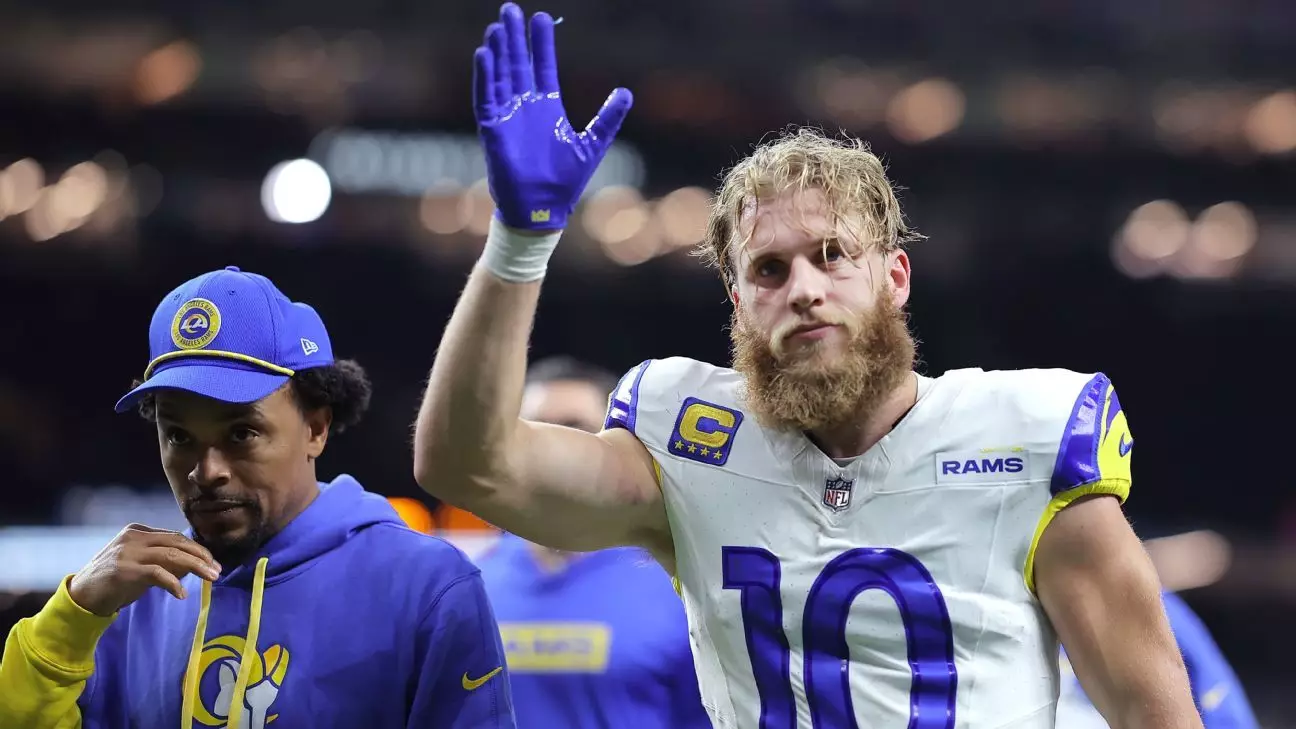In an unexpected turn of events, Cooper Kupp, the star wide receiver for the Los Angeles Rams, has revealed that the franchise has initiated trade discussions concerning his future with the team. This announcement has set the stage for potential changes not only in Kupp’s career trajectory but also in the Rams’ roster strategy for the upcoming seasons. The implications are far-reaching, touching on financial decisions, player development, and the overall direction of the team.
Kupp’s declaration of dissatisfaction with the team’s decision to seek a trade speaks volumes about the dynamics between elite players and management in professional sports. In his statement, Kupp expressed his disappointment and highlighted a desire to remain with the Rams, emphasizing his deep-rooted connection to Los Angeles. His remarks reflect a sentiment that many athletes share—an emotional bond with the team that drafted them, which adds a layer of complexity to the business side of football. Despite his personal feelings, Kupp emphasized his preparedness and motivation to compete at a high level, even if that means doing so in another jersey.
From a financial standpoint, Kupp’s situation is intricate. He signed a lucrative three-year, $80.1 million contract extension following a historic 2021 season, during which he led the NFL in several key receiving categories. However, the structure of the deal raises significant questions about the Rams’ salary cap management. Kupp’s cap hit in the upcoming season is projected at an astonishing $29.8 million, which poses a challenge as the Rams strive to enhance their roster while staying within salary cap regulations. The option to release or trade Kupp affords the team substantial savings, particularly if they execute a trade designated post-June 1.
Moreover, Kupp’s guaranteed salary for 2025 at merely $5 million offers teams an enticing opportunity, particularly given the absence of guaranteed money in the following year of his contract. This financial dynamic means that the Rams must balance their immediate fiscal responsibilities with the potential benefits of retaining a player of Kupp’s caliber.
The narrative around Kupp’s future with the Rams is further complicated by the emergence of Puka Nacua, a receiver who has quickly become instrumental in the team’s passing game. Kupp’s declining production over the past seasons coinciding with Nacua’s performance suggests a shifting focus within the team’s offensive strategy. This evolution points to a broader trend in the NFL, where teams often pivot to younger talent, bolstering their potential for future success. While Kupp’s resume is impressive—culminating in a Super Bowl MVP performance—his ongoing health struggles have raised concerns within the franchise about relying on a player whose performance may not return to its peak levels.
The Rams’ exploration of Kupp’s trade could be interpreted as a proactive approach to reconfiguring their offensive lineup, particularly as they begin to engage with the intricacies of Nacua’s role. The reliance on younger players like Nacua signifies not just a shift in strategy but perhaps a rethinking of how to maximize player potential in an increasingly competitive league.
Kupp’s potential departure introduces a wider conversation about loyalty, athlete management, and the constantly evolving tapestry of professional football. It serves as a reminder of the impermanence of player-team relationships, even among notable figures. Moreover, this situation could impact not just Kupp and the Rams, but also set a precedent for how other franchises evaluate their key players in relation to long-term financial sustainability and on-field performance.
As the offseason approaches and trade rumors escalate, all eyes will be on Kupp and the Rams. The decision made will inevitably influence both the immediate landscape of the team and the larger dynamics of the NFL, showcasing both the personal and business elements entwined in the world of professional sports. Whether Kupp finds himself competing for a championship with a new team or remains with the Rams, one truth is clear; the landscape of professional football, like the careers of its players, is ever-changing.


Leave a Reply